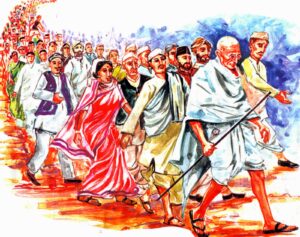Dandi March: A Historic Protest Against British Salt Tax
History Indian HistoryPosted by NewAdmin on 2025-02-10 08:47:57 |
Share: Facebook | Twitter | Whatsapp | Linkedin Visits: 27

The Dandi March, also known as the Salt March, was a pivotal event in India's struggle for independence from British colonial rule. It took place from March 12 to April 6, 1930, and was led by Mahatma Gandhi, the central figure in the Indian freedom movement. The march was a non-violent protest against the British monopoly on salt production and sales, a symbol of the oppressive colonial laws that affected the common people of India.
The British government had imposed a heavy salt tax on the Indian population, making it illegal for Indians to produce or sell salt without paying the tax. This was seen as an unjust exploitation of a basic necessity. Gandhi, recognizing the significance of the issue, decided to launch a campaign that would involve mass participation and draw national and international attention to the cause of Indian independence. The march began in Sabarmati Ashram in Gujarat, with Gandhi and a small group of followers walking towards the coastal village of Dandi, where they would produce salt from seawater as an act of defiance against the British laws.
Over the course of the 24-day march, Gandhi was joined by thousands of Indians from all walks of life. The journey covered around 240 miles, passing through numerous villages, and served as a platform for spreading the message of non-violence and civil disobedience. As Gandhi and his followers reached Dandi on April 6, they produced salt from the sea, openly defying the salt tax.
The Dandi March had a profound impact on the Indian freedom movement. It united people across India in a common cause and galvanized the masses to join the non-cooperation movement. The British response to the march, which included the arrest of thousands of protesters, only strengthened the resolve of the Indian people. The Dandi March is remembered as one of the most iconic acts of peaceful resistance in history, highlighting Gandhi's philosophy of non-violence and civil disobedience as powerful tools for social and political change.
Search
Categories
Recent News
- Rajasthan's Ram Katha U-Turn: Teachers Recalled from Religious Event
- Earth's Atmosphere: A Cosmic Balancing Act
- Indian Shooting Triumphs: Rana's Bronze and Team Silver
- Andhra Pradesh MLA's Unique Scooter Inspection Tour
- Air India's Fuel Switch Woes: A Troubling Pattern
- Mamata Banerjee's Supreme Court Showdown: A Battle for Democracy
- AP EAPCET 2026: Unlocking Andhra Pradesh's Engineering Aspirations
- Fatal Leap: Man's Tragic Encounter with Overhead Wires
Popular News
- Navigating IPO Market Dynamics Amid Volatility and Regulatory Changes
- Massive Worldwide Microsoft Outage Disrupts Multiple Sectors
- Panjapur Bus Stand to Reshape TNSTC Routes
- తెలుగుదేశం పార్టీ - పేదరికాన్ని నిర్మూలించడంలో వాగ్దానం
- Universities Embrace Remote Learning Technologies Amidst Ongoing Pandemic